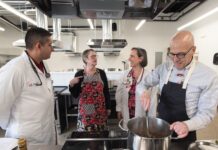
A lonely road to success. That’s how Douglas Craddock, Jr., clinical assistant professor and Chief of Staff, College of Education & Human Development, describes his experience as a doctoral student several years ago at a university located in Alabama. He quickly learned it was not a unique experience among other Black male graduate students throughout the United States.
“Although many colleges and universities are set up to assist, they often are not intentional about reaching Black, Indigenous and People of Color (BIPOC), specifically Black male doctoral students,” he said.
Craddock is now working to change that through the Black Male EDquity Network (B.M.E.N.), a grassroots effort focused on creating a pipeline of Black male educators in multiple disciplines.
“As many of these individuals are the ‘only ones,’ it is vital to have a support system to ensure their program of study completion,” he said. “At its core, B.M.E.N. centers on the chance to build a linkage of brothers from all levels that can positively impact areas of job hiring, research and publications, teaching and general support that can only be found within the confines of this group.”
From high school to graduate programs, Black male graduation rates rank at the bottom of the list. B.M.E.N. seeks to improve and change the status quo. Embracing UofL’s values and vision to attract, retain and support students, faculty and staff who reflect the diversity of our larger society, the initiative works across degree programs, fields of study and even college campuses.
Jerron Jones, a PhD student at Bellarmine University, is one of 12 current graduate students involved in B.M.E.N.
“I chose to be part of the Black Male EDquity Network because I knew it would increase my motivation, accountability and illuminate the importance of degree completion,” Jones said. “Understanding the opportunities to cultivate a sense of community with professionals and scholars that represent different lived experiences, but more importantly men who identify as Black or Brown, solidified my decision to join B.M.E.N.”
In addition to Craddock, other UofL faculty and administrators include Dwayne Compton, Marc Ellis, Jelani Kerr and Randy Whetstone. Therron Rogers, of Rush University, is involved, as well.

Members of B.M.E.N. also are making an impact on the community by building a relationship with local schools centered on social entrepreneurship, poverty, civic engagement and social justice.
Over the course of nine weeks, the men helped facilitate conversations centered on racism, implicit bias and microaggressions. As part of the lessons, youth discussed encountering injustices, economic barriers, racial slurs and domestic violence. Some students also shared past personal experiences or stories they witnessed in other communities.
UofL College of Business doctoral student Malcolm Muhammad says he is grateful for the B.M.E.N. mentors who have positively shaped his own educational experience, and is glad to pass it forward.
“Over the past few years, I’ve developed an extreme sense of urgency to pour all that I’ve learned into youth that are marginalized and aren’t typically exposed to the same level of opportunities as others,” Muhammad said. “It’s very fulfilling to help guide the youth who will be responsible for building a more equitable future. Based on these experiences, I think the future is bright.”
































